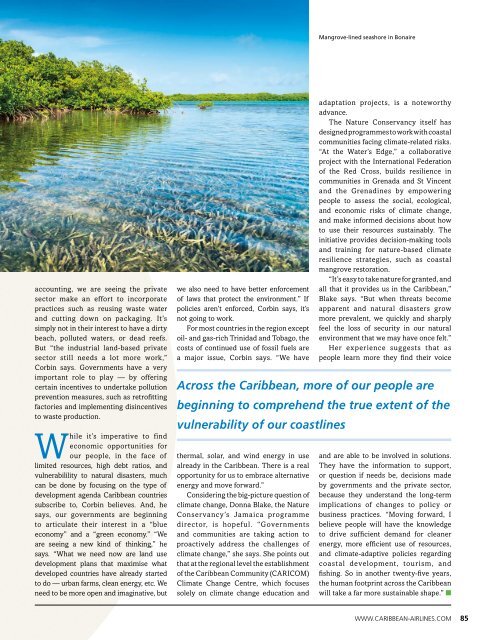Caribbean Beat — 25th Anniversary Edition — March/April 2017 (#144)
A calendar of events; music, film, and book reviews; travel features; people profiles, and much more.
A calendar of events; music, film, and book reviews; travel features; people profiles, and much more.
Create successful ePaper yourself
Turn your PDF publications into a flip-book with our unique Google optimized e-Paper software.
Mangrove-lined seashore in Bonaire<br />
accounting, we are seeing the private<br />
sector make an effort to incorporate<br />
practices such as reusing waste water<br />
and cutting down on packaging. It’s<br />
simply not in their interest to have a dirty<br />
beach, polluted waters, or dead reefs.<br />
But “the industrial land-based private<br />
sector still needs a lot more work,”<br />
Corbin says. Governments have a very<br />
important role to play <strong>—</strong> by offering<br />
certain incentives to undertake pollution<br />
prevention measures, such as retrofitting<br />
factories and implementing disincentives<br />
to waste production.<br />
While it’s imperative to find<br />
economic opportunities for<br />
our people, in the face of<br />
limited resources, high debt ratios, and<br />
vulnerabilility to natural disasters, much<br />
can be done by focusing on the type of<br />
development agenda <strong>Caribbean</strong> countries<br />
subscribe to, Corbin believes. And, he<br />
says, our governments are beginning<br />
to articulate their interest in a “blue<br />
economy” and a “green economy.” “We<br />
are seeing a new kind of thinking,” he<br />
says. “What we need now are land use<br />
development plans that maximise what<br />
developed countries have already started<br />
to do <strong>—</strong> urban farms, clean energy, etc. We<br />
need to be more open and imaginative, but<br />
we also need to have better enforcement<br />
of laws that protect the environment.” If<br />
policies aren’t enforced, Corbin says, it’s<br />
not going to work.<br />
For most countries in the region except<br />
oil- and gas-rich Trinidad and Tobago, the<br />
costs of continued use of fossil fuels are<br />
a major issue, Corbin says. “We have<br />
thermal, solar, and wind energy in use<br />
already in the <strong>Caribbean</strong>. There is a real<br />
opportunity for us to embrace alternative<br />
energy and move forward.”<br />
Considering the big-picture question of<br />
climate change, Donna Blake, the Nature<br />
Conservancy’s Jamaica programme<br />
director, is hopeful. “Governments<br />
and communities are taking action to<br />
proactively address the challenges of<br />
climate change,” she says. She points out<br />
that at the regional level the establishment<br />
of the <strong>Caribbean</strong> Community (CARICOM)<br />
Climate Change Centre, which focuses<br />
solely on climate change education and<br />
adaptation projects, is a noteworthy<br />
advance.<br />
The Nature Conservancy itself has<br />
designed programmes to work with coastal<br />
communities facing climate-related risks.<br />
“At the Water’s Edge,” a collaborative<br />
project with the International Federation<br />
of the Red Cross, builds resilience in<br />
communities in Grenada and St Vincent<br />
and the Grenadines by empowering<br />
people to assess the social, ecological,<br />
and economic risks of climate change,<br />
and make informed decisions about how<br />
to use their resources sustainably. The<br />
initiative provides decision-making tools<br />
and training for nature-based climate<br />
resilience strategies, such as coastal<br />
mangrove restoration.<br />
“It’s easy to take nature for granted, and<br />
all that it provides us in the <strong>Caribbean</strong>,”<br />
Blake says. “But when threats become<br />
apparent and natural disasters grow<br />
more prevalent, we quickly and sharply<br />
feel the loss of security in our natural<br />
environment that we may have once felt.”<br />
Her experience suggests that as<br />
people learn more they find their voice<br />
Across the <strong>Caribbean</strong>, more of our people are<br />
beginning to comprehend the true extent of the<br />
vulnerability of our coastlines<br />
and are able to be involved in solutions.<br />
They have the information to support,<br />
or question if needs be, decisions made<br />
by governments and the private sector,<br />
because they understand the long-term<br />
implications of changes to policy or<br />
business practices. “Moving forward, I<br />
believe people will have the knowledge<br />
to drive sufficient demand for cleaner<br />
energy, more efficient use of resources,<br />
and climate-adaptive policies regarding<br />
coastal development, tourism, and<br />
fishing. So in another twenty-five years,<br />
the human footprint across the <strong>Caribbean</strong><br />
will take a far more sustainable shape.” n<br />
WWW.CARIBBEAN-AIRLINES.COM 85


















